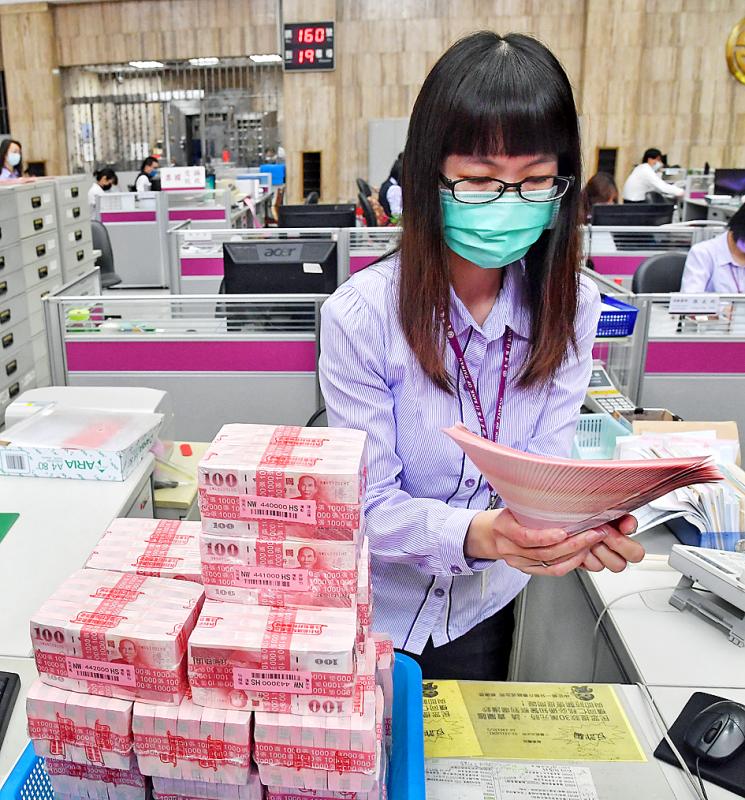The central bank has amended foreign-exchange regulations for companies and individuals to give it more flexibility in curbing currency speculation in a timely fashion.
The changes, due to take effect on Feb. 17, come after moral suasion failed to discourage companies, especially exporters, from currency trading practices intended to hedge against foreign-exchange losses, but contributed to the New Taiwan dollar’s appreciation.
The central bank on Wednesday evening announced plans to revise foreign-exchange rules that over the years cap foreign currency settlements at US$50 million for companies and US$500,000 for individuals per year.

Photo: CNA
It added a clause allowing it to adjust the limits whenever necessary to maintain an orderly and stable foreign-exchange market.
The bank has called on local companies to help maintain the local currency’s stability, emphasizing that a strong NT dollar would hurt their own profitability.
The NT dollar has repeatedly climbed above the NT$28 mark in intraday trading against the greenback, before closing lower due in part to the central bank’s alleged last-minute intervention.
Major technology firms have told investors that unfavorable foreign exchanges are eating away their profits, despite strong revenue growth.
Some local firms reportedly borrow US dollars abroad and sell them at higher rates on the local market to guard against foreign-exchange losses.
Some have gone so far as to create front companies in a bid to circumvent the annual US$50 million limit per company, local reports said.
Most companies have never demonstrated settlement needs larger the threshold until recently, the central bank said last month, suspecting currency speculation on the part of exporters.
“The current indiscriminate treatment appears inadequate and the central bank would make timely adjustments to reflect real corporate needs,” the bank said, adding that the latest changes aim to close the loopholes.
Companies with greater settlement needs can file applications through their banks, it said.
Other companies allegedly seek to profit by borrowing US dollars from affiliates abroad with a view to benefitting from favorable exchange rates later, reports said.
Companies should seek funding in conventional ways and avoid questionable currency trading, the bank said.
The bank is also weighing disciplinary measures against four foreign lenders for helping grain merchants engage in currency trading, in contravention of foreign-exchange rules.

Stephen Garrett, a 27-year-old graduate student, always thought he would study in China, but first the country’s restrictive COVID-19 policies made it nearly impossible and now he has other concerns. The cost is one deterrent, but Garrett is more worried about restrictions on academic freedom and the personal risk of being stranded in China. He is not alone. Only about 700 American students are studying at Chinese universities, down from a peak of nearly 25,000 a decade ago, while there are nearly 300,000 Chinese students at US schools. Some young Americans are discouraged from investing their time in China by what they see

Taiwan Transport and Storage Corp (TTS, 台灣通運倉儲) yesterday unveiled its first electric tractor unit — manufactured by Volvo Trucks — in a ceremony in Taipei, and said the unit would soon be used to transport cement produced by Taiwan Cement Corp (TCC, 台灣水泥). Both TTS and TCC belong to TCC International Holdings Ltd (台泥國際集團). With the electric tractor unit, the Taipei-based cement firm would become the first in Taiwan to use electric vehicles to transport construction materials. TTS chairman Koo Kung-yi (辜公怡), Volvo Trucks vice president of sales and marketing Johan Selven, TCC president Roman Cheng (程耀輝) and Taikoo Motors Group

MAJOR DROP: CEO Tim Cook, who is visiting Hanoi, pledged the firm was committed to Vietnam after its smartphone shipments declined 9.6% annually in the first quarter Apple Inc yesterday said it would increase spending on suppliers in Vietnam, a key production hub, as CEO Tim Cook arrived in the country for a two-day visit. The iPhone maker announced the news in a statement on its Web site, but gave no details of how much it would spend or where the money would go. Cook is expected to meet programmers, content creators and students during his visit, online newspaper VnExpress reported. The visit comes as US President Joe Biden’s administration seeks to ramp up Vietnam’s role in the global tech supply chain to reduce the US’ dependence on China. Images on

New apartments in Taiwan’s major cities are getting smaller, while old apartments are increasingly occupied by older people, many of whom live alone, government data showed. The phenomenon has to do with sharpening unaffordable property prices and an aging population, property brokers said. Apartments with one bedroom that are two years old or older have gained a noticeable presence in the nation’s six special municipalities as well as Hsinchu county and city in the past five years, Evertrust Rehouse Co (永慶房產集團) found, citing data from the government’s real-price transaction platform. In Taipei, apartments with one bedroom accounted for 19 percent of deals last